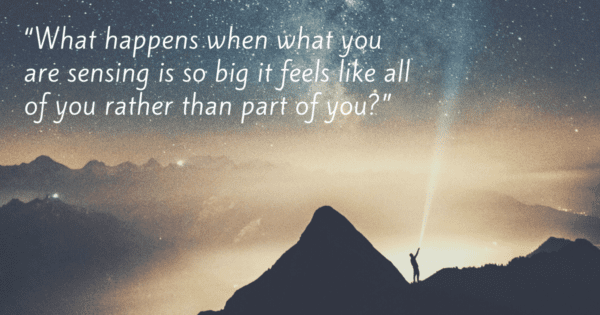~~~~~~~~~~~~~~~~~~~~~~~~~~~~~~~~~~~~~~~~~~
"How Do You Present Focusing to a Client...?"
~~~~~~~~~~~~~~~~~~~~~~~~~~~~~~~~~~~~~~~~~~
Laura writes: "How do you present Focusing to
a client in a therapeutic setting without
intellectualizing or describing the process
too much, and yet smoothly transitioning into
it..."
Dear Laura
As you know, the Focusing process fits well
with any type of therapy. Whether they know
it or not, all therapists hope their clients
are doing a kind of Focusing. In other words,
all therapists hope their clients are
self-aware in such a way that what happens in
therapy has an inner impact. Insight alone is
never enough. Even Freud knew that!
Today, more and more therapy modalities are
explicitly including the body and the
emotions as key components of change for the
client. When we add to that Gendlin's concept
of the felt sense and the implicit
texture of experience, we have the basis for
even more effective therapy for our clients.
But... that does not mean that a therapist
adding Focusing to his/her work with clients
needs to explain it to them.
For example, the first step in adding
Focusing to therapy is
to listen for those places where your client
is already referring directly to something
presently felt or unclear... and help him or
her stay with that a bit longer.
"I don't know how I would describe this
feeling," said one client, gesturing at her
throat. The therapist recognized one of the
key indicators of Focusing: having an
experience that's more than words can say yet.
"Maybe it's OK not to describe it yet...
maybe you can just stay with it and sense
it." There's no need to say "This is Focusing."
That's one example; there are many more.
~~~~~~~~~~~~~~~~~~~~~~~~~~~~~~~~~~~~~~~~~~
The Body Has its Own Intelligence
~~~~~~~~~~~~~~~~~~~~~~~~~~~~~~~~~~~~~~~~~~
Having said that, there are times when we do
want to say something about Focusing, perhaps
when a client asks us why we are inviting him
or her to stay with something unclear.
CC Leigh, Fort Collins Colorado teacher of
the spiritual
practice Waking Down in Mutuality, has this
way of saying it that I really like: "The
body has its own
intelligence that's different from our usual
intelligence. It moves more slowly than the
mind."
Another possibility might be: "It turns out
that the very places in us that are unclear
and hard to describe are the doorways that
open up to change."
Or how about: "If what you already know about
your problems and issues was enough to help
you change, that would have happened already.
There is a place in you that knows more, but
it needs time and gentle listening from you,
to open up. Let me show you how to do that."

Get helpful ways to feel more empowered, calmer, and better able to handle whatever life brings you (in less than 10 minutes a day!).
OUR VISION
The intention of Focusing Resources is to meaningfully contribute to personal, community, and global emotional health, with the understanding that positive emotional health impacts how fairly we treat each other, how well and quickly we recover from stress and trauma, and how wisely and collaboratively we meet the serious challenges we are all facing.
CONNECT WITH US
Focusing Resources, Inc.
1474 University Ave, #155, Berkeley, CA 94702
T: 510-225-0690 | Email Us
©2024 Focusing Resources, Inc. Photos of Ann and Barbara by: In Her Image Photography & Cia Gould



